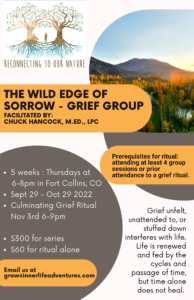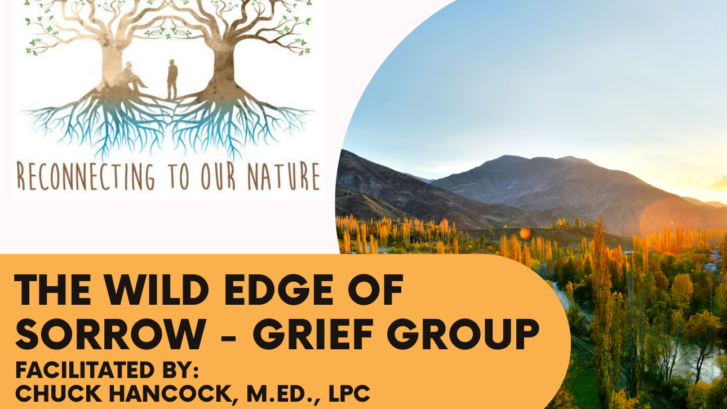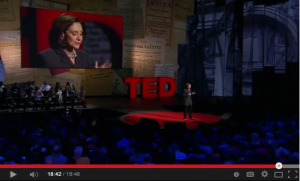Rituals of Renewal and the Sacred Work of Grief
Usually in our culture we only touch grief when we lose a loved one,
however now more than ever much is being lost and there is much to grieve.
You are invited to learn and work with your grief in this group. Whether your loss is a loved one, a job, environmental destruction, racial trauma and systemic oppression, ancestral lineage or anything that stirs sorrow or grief for you. Together we will share and grow our relationship with grief as we read The Wild Edge of Sorrow by Francis Weller. Anchored by the book, we will heal with our grief through writing, sharing, listening, and both individual and group ritual.
Everything we love we will lose. Most of us have lost someone or something valuable already. Grief unfelt, unattended to, or stuffed down interferes with life. Life is renewed and fed by the cycles and passage of time, but time alone does not heal. We can re-align back into the flow of life gain vibrancy by harvesting the meaning and purpose from our experiences, especially those that stir grief by tending to these processes intentionally.
Join us for a 6 week experiential group to deepen in relationship to grief, form community, be in ritual, support others, and connect more fully to your human experience including life, death, and more renewed vibrant life.
In this group you will explore, deepen, and strengthen your connection and relationships to:
 Yourself
Yourself- Grief and Loss
- Healthy Adult Life Development
- The World’s Challenges and Sorrows
- Our Relationship with and Impact on Nature
- People that have lived before you
- Your ancestry
- Cycles of life and death
- Shared human experience
You will leave renewed and re-committed to living fully, nourished and enlivened by the depths of your soul.
Group will meet for 5 weeks of educational and prep work culminating with a final ritual to move through the energies of grief in a supportive community container.
Thursdays 6:00-8:00PM, September 29-November 3, 2022. (Ritual will be 6:00-9:00).
$300 for series. $60 for ritual alone. (Stand alone ritual is only an option if you have previously attended a grief ritual. Otherwise, you need to attend at least 4 sessions of the group.)
Facilitator: Chuck Hancock, M.Ed., LPC has been apprenticing with grief since childhood and has been focusing on healthier expressions of grief through ritualized community shared practices over the past decade. Drawing on conventional western approaches as well as his study with mentors of indigenous practices of America and West Africa Chuck creates a group container creating a supportive healing relationship with all forms of grief we experience in life.




